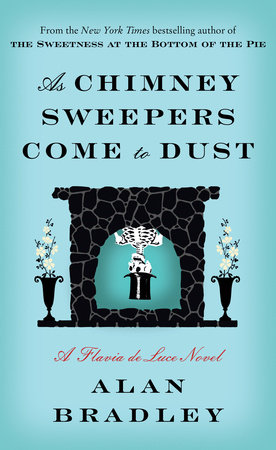 Since we’ve already discussed the severe gynocentricity of Misty’s bookshelf, it is time to state in her defense that she does occasionally read and enjoy male authors, and she can even read and enjoy male authors writing from the point of view of female characters. And while she generally regards with great caution any work written from the point of view of an 11-year-old girl, she did have the great good fortune several years ago of picking up Alan Bradley‘s The Sweetness at the Bottom of the Pie.
Since we’ve already discussed the severe gynocentricity of Misty’s bookshelf, it is time to state in her defense that she does occasionally read and enjoy male authors, and she can even read and enjoy male authors writing from the point of view of female characters. And while she generally regards with great caution any work written from the point of view of an 11-year-old girl, she did have the great good fortune several years ago of picking up Alan Bradley‘s The Sweetness at the Bottom of the Pie.
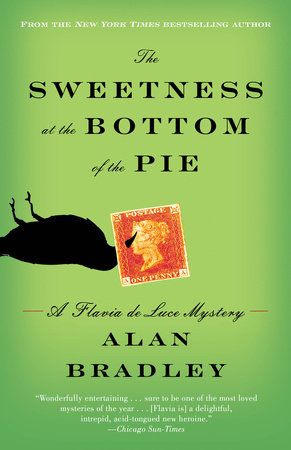 Enough with the third person. Normally, I am not drawn to the mystery genre; death, especially murder, paled for me as a source of recreation or amusement somewhere in my early 20s. Also, I typically, with all politeness, avoid child characters because while childhood was a joyous and innocent time in my life, I prefer the complexities and subtleties presented by adult narrators, adult sensibilities, adult conflicts. But there were certain tantalizing little details about this book. A Canadian author with a varied and interesting career now turning his hand to mystery novels. A setting in idyllic rural England in the 1950s. And a main character who, despite her youth, is interested in chemistry, particularly the applications and uses of poisons. Given her name – Flavia de Luce – there was just enough hint of a sly, satiric sense of whimsy (plus the cover art) that made me pluck it off the “new” rack at the college library, before it was a bestseller, before it had won all the awards, before it had spawned an entire and entirely engaging series.
Enough with the third person. Normally, I am not drawn to the mystery genre; death, especially murder, paled for me as a source of recreation or amusement somewhere in my early 20s. Also, I typically, with all politeness, avoid child characters because while childhood was a joyous and innocent time in my life, I prefer the complexities and subtleties presented by adult narrators, adult sensibilities, adult conflicts. But there were certain tantalizing little details about this book. A Canadian author with a varied and interesting career now turning his hand to mystery novels. A setting in idyllic rural England in the 1950s. And a main character who, despite her youth, is interested in chemistry, particularly the applications and uses of poisons. Given her name – Flavia de Luce – there was just enough hint of a sly, satiric sense of whimsy (plus the cover art) that made me pluck it off the “new” rack at the college library, before it was a bestseller, before it had won all the awards, before it had spawned an entire and entirely engaging series.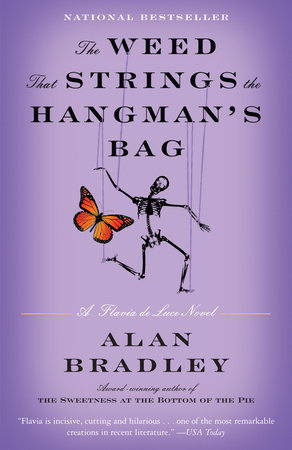
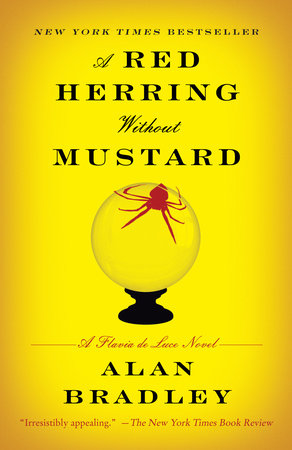
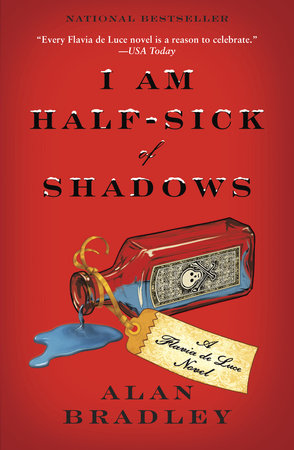 Obviously, I was on to something. There are now eight entries in the Flavia de Luce canon – the most recent book being As Chimney Sweepers Come to Dust, preceded by a short story, The Curious Case of the Copper Corpse – and all of them, to my knowledge, have been bestsellers. Some are more eerie than charming; some are more whimsical than shuddery; all of them are eerily charming, whimsically endearing, and often surprisingly touching. It’s not just me. Flavia has her own fan club. There is a TV series in development. Whether the appeal rests in Flavia’s Sherlockian powers of deduction, nostalgia for a post-war England, the chemistry experiments upon which the plots often turn, or the pervasive literary references (Flavia, through her elder sister Daphne, is extremely well-read) the combination is a success. Flavia is winning, charming, adorable, fierce, and makes us believe that we were exactly like her at 11-years-old (excepting the extensive knowledge of poisons, for most).
Obviously, I was on to something. There are now eight entries in the Flavia de Luce canon – the most recent book being As Chimney Sweepers Come to Dust, preceded by a short story, The Curious Case of the Copper Corpse – and all of them, to my knowledge, have been bestsellers. Some are more eerie than charming; some are more whimsical than shuddery; all of them are eerily charming, whimsically endearing, and often surprisingly touching. It’s not just me. Flavia has her own fan club. There is a TV series in development. Whether the appeal rests in Flavia’s Sherlockian powers of deduction, nostalgia for a post-war England, the chemistry experiments upon which the plots often turn, or the pervasive literary references (Flavia, through her elder sister Daphne, is extremely well-read) the combination is a success. Flavia is winning, charming, adorable, fierce, and makes us believe that we were exactly like her at 11-years-old (excepting the extensive knowledge of poisons, for most).
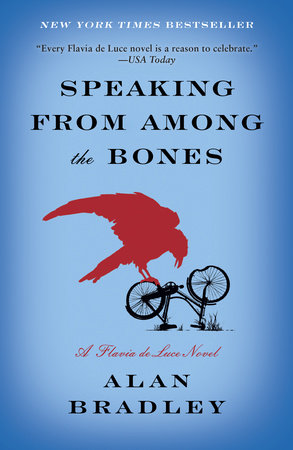 But here I want to make a claim for the feminism of Flavia de Luce, both as a person and a series. These books offer a world that is entirely constructed around the viewpoint of a young girl, a person whose intellectual powers are constantly being underestimated or undervalued by those around her. Yet Flavia generally has the upper hand, even when the adults around her don’t realize it. Her interior world is so perfectly portrayed, with all her macabre fascinations, and her interests so pitch-perfect that she comes across as utterly engaging and real. Even her limitations are endearing, including her fractious relationships with her elder sisters, the careful dance she conducts around her self-absorbed father, and the ever-present ache for her missing mother, Harriet. In short this series makes an argument for taking pre-adolescent females far more seriously than we generally do, and valuing them for their minds and talents and capabilities, not just for their personalities or potential.
But here I want to make a claim for the feminism of Flavia de Luce, both as a person and a series. These books offer a world that is entirely constructed around the viewpoint of a young girl, a person whose intellectual powers are constantly being underestimated or undervalued by those around her. Yet Flavia generally has the upper hand, even when the adults around her don’t realize it. Her interior world is so perfectly portrayed, with all her macabre fascinations, and her interests so pitch-perfect that she comes across as utterly engaging and real. Even her limitations are endearing, including her fractious relationships with her elder sisters, the careful dance she conducts around her self-absorbed father, and the ever-present ache for her missing mother, Harriet. In short this series makes an argument for taking pre-adolescent females far more seriously than we generally do, and valuing them for their minds and talents and capabilities, not just for their personalities or potential.
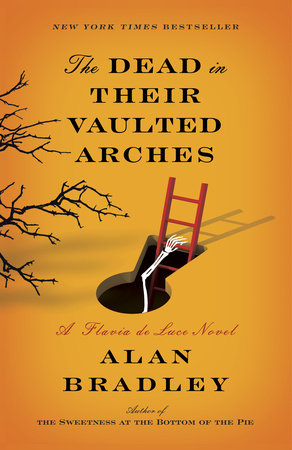 The power of the missing Harriet is a further argument for the series’ feminist sensibilities – and by this I mean not just female-centric, but acknowledging and even celebrating the power of intelligence in a female subject. Unlike the fairy tales in which the absent mother plays no role whatsoever, or the initial household of King Lear (which the de Luce family somewhat resembles, if you take away Edmund and make Kent into Dogger, the faithful but shell-shocked handyman), Harriet is very present, and the more we learn about her, the more influential we realize she is, not just in death but in life. Furthermore, whereas in early books Flavia has frequent and often egalitarian interactions with males both adult and youthful, in Chimney Sweepers she enters the world of Miss Bodycote’s Female Academy, an enclave entirely dedicated to educating young women not in the arts of domesticity but in being fully functional, contributing members of a public world. In the previous books, women are as frequently villains as they are allies—an argument in itself for women’s agency—but at Miss Bodycote’s, the men are largely peripheral and the women are calling the shots. It all seems a little subversive, really. There’s a hint of secret spy organization which Flavia is presumably being readied to enter the ranks of, and a chief player in it is Flavia’s own Aunt Felicity, who in early books shows up as a dotty spinster and only later emerges as a woman of influence, wisdom, and political pull. And not as the mistress or companion of a powerful man, but in her own right.
The power of the missing Harriet is a further argument for the series’ feminist sensibilities – and by this I mean not just female-centric, but acknowledging and even celebrating the power of intelligence in a female subject. Unlike the fairy tales in which the absent mother plays no role whatsoever, or the initial household of King Lear (which the de Luce family somewhat resembles, if you take away Edmund and make Kent into Dogger, the faithful but shell-shocked handyman), Harriet is very present, and the more we learn about her, the more influential we realize she is, not just in death but in life. Furthermore, whereas in early books Flavia has frequent and often egalitarian interactions with males both adult and youthful, in Chimney Sweepers she enters the world of Miss Bodycote’s Female Academy, an enclave entirely dedicated to educating young women not in the arts of domesticity but in being fully functional, contributing members of a public world. In the previous books, women are as frequently villains as they are allies—an argument in itself for women’s agency—but at Miss Bodycote’s, the men are largely peripheral and the women are calling the shots. It all seems a little subversive, really. There’s a hint of secret spy organization which Flavia is presumably being readied to enter the ranks of, and a chief player in it is Flavia’s own Aunt Felicity, who in early books shows up as a dotty spinster and only later emerges as a woman of influence, wisdom, and political pull. And not as the mistress or companion of a powerful man, but in her own right.
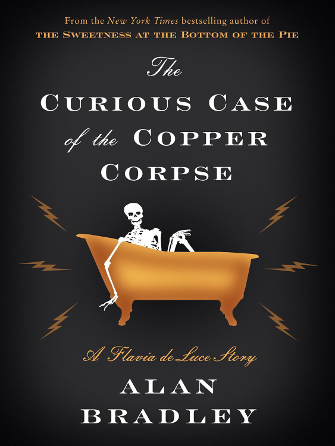 That’s the last and most refreshing part of Flavia’s feminism: she doesn’t get where she is because of beauty, sexual appeal, or her power over a male. Her successes are entirely due to her own wits and brains. In fact any notion of love affairs is wonderfully far from the picture. Flavia’s loves and passions include, in no particular order, her chemistry lab; her bicycle, Gladys; the discovery of a twitching corpse; her home, Buckshaw; and a jolly fireworks display. Her one enduring crush is on the Inspector’s wife, Antigone, that epitome of tea-drinking grace, and Flavia’s reverence for her is another point entirely true to the character and sensibility of a tween.
That’s the last and most refreshing part of Flavia’s feminism: she doesn’t get where she is because of beauty, sexual appeal, or her power over a male. Her successes are entirely due to her own wits and brains. In fact any notion of love affairs is wonderfully far from the picture. Flavia’s loves and passions include, in no particular order, her chemistry lab; her bicycle, Gladys; the discovery of a twitching corpse; her home, Buckshaw; and a jolly fireworks display. Her one enduring crush is on the Inspector’s wife, Antigone, that epitome of tea-drinking grace, and Flavia’s reverence for her is another point entirely true to the character and sensibility of a tween.
That an entire series could be devoted to a young female sleuth, and enjoy such success, says much for Bradley’s talent at constructing a compelling character and a good mystery, but it also says much for the kinds of things we readers crave. Carefully crafted and believable worlds, interior and exterior, focused on the minds and deeds of women who, whatever their age, are out to save their country, protect their community, solve mysteries, and advance the common good. Let’s hear it for Flavia, feminist icon! Long may she reign, and long may Bradley’s pen pour forth her sleuthing adventures.

This series looks like so much fun! As a kid I couldn’t get into either Nancy Drew or Hardy Boys, but I loved Trixie Belden. I haven’t really read mysteries since, but I’m going to give Flavia a try. Thanks for the tip!